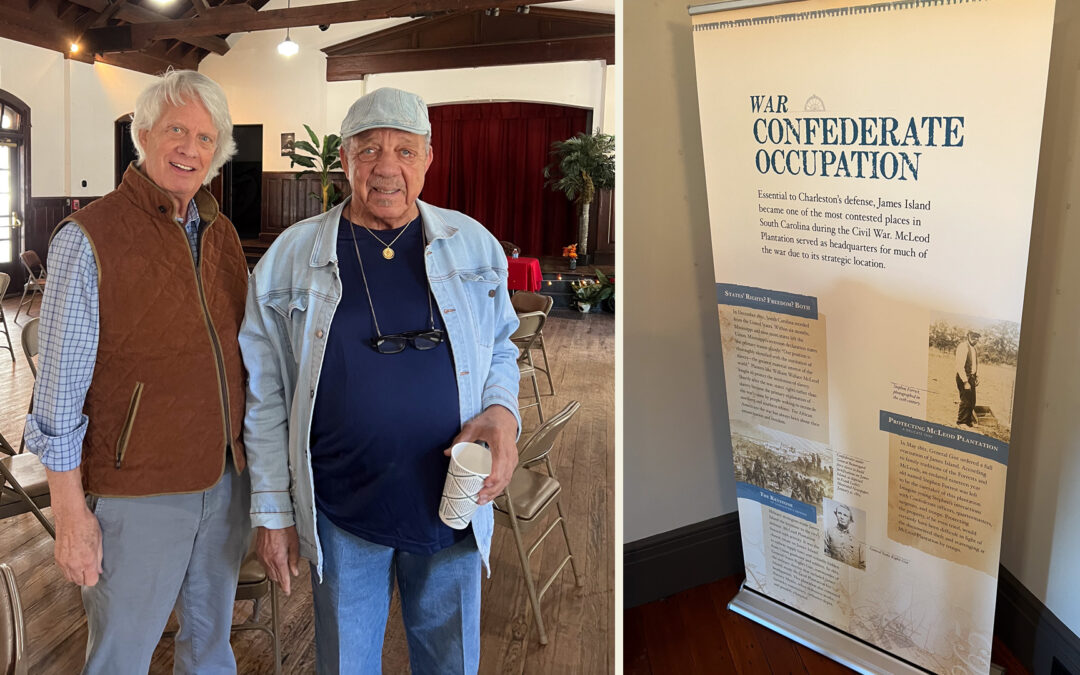
by Robert Bowie, Jr. | Nov 12, 2025 | Featured, Personal, Travel
There is nothing sadder than the moment that you realize you have missed the chance for an apology or an “I love you” that can’t be delivered because it’s too late.
At the end of my recent guided trip to Savannah, Georgia and Charleston, South Carolina I had back-to-back realizations of long-lost opportunities to apologize and to say “I love you.”
I have previously written about the trip that my friends and I took a year and a half ago to witness the history of the nonviolent practices of Martin Luther King, Jr. and the effort to enforce the civil rights laws in the western part of the south.
The focus of this trip was to follow the American slave trade pretty much from its beginning at two of the entry points and places between — from its beginnings to its end. It was a powerful experience and an amazing trip because it shook me to my roots and changed my understanding.
There are people who pass through your life and then before you can truly understand the dignity of their life and the kindness which they showed you before they are gone. In my case, one was Florine and the other was Jane. Both were Black women.
There is a fair amount of written material that documents the slave trade in America but it only becomes real when you are standing in a slave cell in which human beings were held for extended periods of time before they were auctioned into slavery, and after they had withstood the travel, in which 20% of the cargo are lost by the end of that journey.
Ten percent died on the ship and the other 10% were the unruly who couldn’t be sold. Sharks followed these ships across the waters to their destination.
As usual, I had read the dates and about the places, but to walk into slave quarters or visit buildings which have been inhabited during whippings, and experience the culture of slavery made it all real for the first time.
Slave women were forced to be kept pregnant, because they were producing product and this product was valuable. When they were old enough, the children would be sold and be lost forever. At birth, they were given only a first name no last name. After emancipation, they often just assumed the last name of their owners.
Chewing cotton roots was known to be an abortive for female slaves who did not want to bring their children into a world of degradation, however, if a pregnant slave was caught chewing cotton roots, they would receive 36 lashes, which is an unthinkably cruel punishment, especially for a pregnant woman.
Whipping was also administered to punish both slaves and their educators if it was discovered that a slave was being taught to read or write or learned mathematics such as the multiplication tables.
Florine Burk took care of my little brother and I in the late 1950s when we were kids in Washington, DC. She was a heavyset African-American woman in her 50s who had grown up in the South and had gotten her education in a single room school.
She was a force.
She could sing the alphabet and the multiplication tables. She was an avid reader who never spoke about her politics but you could feel by her presence what she thought.
She loved and knew a whole lot about Jackie Robinson and the Brooklyn Dodgers. My brother and I were required to memorize and recite the lineup for the Brooklyn Dodgers.
My brother and I loved her. She would hoist up her skirts and hit long fly balls in the backyard. If my brother or I hit a ball over the fence and through a neighbors window, she took our hand, walked us around the block, got us to knock on the door, made us promise that we would fix the window, and then she took us out to buy the glass and the caulking, and we would put in the window as she watched.
Eventually, we asked her to take us to a Washington Senators baseball game. She refused, and there was no doubt we were never gonna go with her to a Washington Senators baseball game.
Her reason, she said, was that Washington was “first in war, first in peace, and last in the American League.” She said she did not want us to witness bad baseball.
It was the 1950s, but it wasn’t her real reason and you could feel it, but I didn’t know what the real reason was until the last day of our recent trip.
Some things you have to learn late in life, and this trip taught me to look deeper into for Florine’s logic.
The morning before the end of the trip, I went online and researched the Washington Senators and found that they were one of the last teams in baseball to ever hire an African-American. They had drafted a black Cuban pitcher and identified him only as Cuban.
Florine knew her stuff. But this trip made me realize that I did not understand the depth of her character or what life must have felt like to her as a domestic raising white children in a brutally segregated city.
After she retired, she went to Los Angeles to be with family there. My brother and I wrote her birthday cards each year and sent her Christmas cards. After a few years, they would be returned to us unopened. I never told her face-to-face how much we loved her and respected her before she died.
That morning, I also realized the pain of a court clerk at the first trial I ever did in the Circuit Court of Baltimore City. I had been told that if you don’t know the judge or what to expect in the courtroom the first thing you do after you unpack is talk to the court clerk and try to make friends.
The court clerk was an entirely professional Black middle-aged woman who shook my hand and welcomed me to the courtroom when I offered my name and explained why I was there.
I put out my hand and said “I am Bob Bowie. What is your name?” She replied, “My name is Jane Bowie.”
She was instructive throughout the case and helped me when I asked my naïve questions. After the trial, I went over and thanked her and said how much I appreciated that we both had the same last name, and I had “a family friend in the court.” She smiled and laughed and patted me on the shoulder.
Over the next few years, I would see her on the streets around the courthouse and we would stop and talk. We became friends.
On this trip to South Carolina, we went to a museum that had only people‘s first names engraved in the walls at the entry room. I asked why were there only first names and the guide politely said during slavery, there were no last names, only afterward did many of the slaves just pick up the last name of the slave holder.
My family owned slaves in Prince Georges County. Much to my horror, I realized that Jane Bowie most likely came from an enslaved family that my family may have owned.
I was stunned and ashamed, but then I realized, and deeply respected, the kindness that she had offered me in the face of this country’s white supremacist history. Jane, like Florine, vanished 20 years ago and I never had the chance to recognize what she knew and the courage she had in dealing with me.
I fear that even in this generation, our children will look back and wonder how we could have looked the other way when immigrants came to this country and, as punishment, they were separated from their children when all they wanted was a chance to be free to raise them.
If you’ve ever had a blood transfusion, you never know whose blood it was. It was given as a gift from one human being to provide life for another. It’s a reminder of our common humanity, but we never quite live up to the obvious.
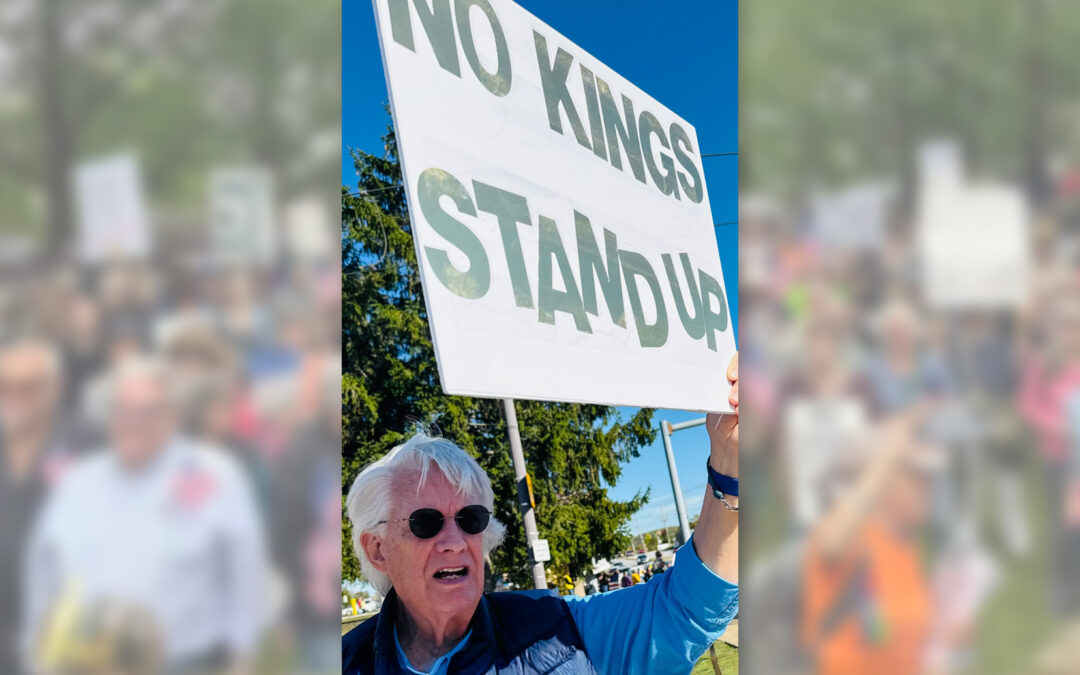
by Robert Bowie, Jr. | Oct 21, 2025 | Featured, Personal, Politics, Travel
This past weekend, I was reminded of this excerpt from my book, “The Older You Get the Shorter Your Stories Should Be” (page 169):
As the lions slowly approach, my fellow riders in the safari jeep become either “believers” that the jeep is safe territory or “nonbelievers” who, with every step of the lions, seem to be counting down the last seconds of their lives. They can’t move and the fear becomes palpable. The eyes are wide and the breathing becomes slightly labored.
On the other hand, the believers are happily photographing and silently adjusting their telescopic lenses. The lions grow closer and closer and, within 10 feet, three veer to the right and one veers to the left so that it will be behind us. Everyone in the jeep recognizes that they must keep their eyes on the three lions that will pass to our left within several feet of the jeep, but we will not be able to turn and watch the one lion that is moving behind us on our right.
The believers continue to happily photograph adjusting their telescopic lens to catch the reflection of the jeep in a lion’s eyes. The nonbelievers are breathing softly, their eyes closed, waiting for death.
After a few moments they were past us and we started the engine and continued our day.
(You can find the book on amazon or support local bookstores at bookshop.org.)
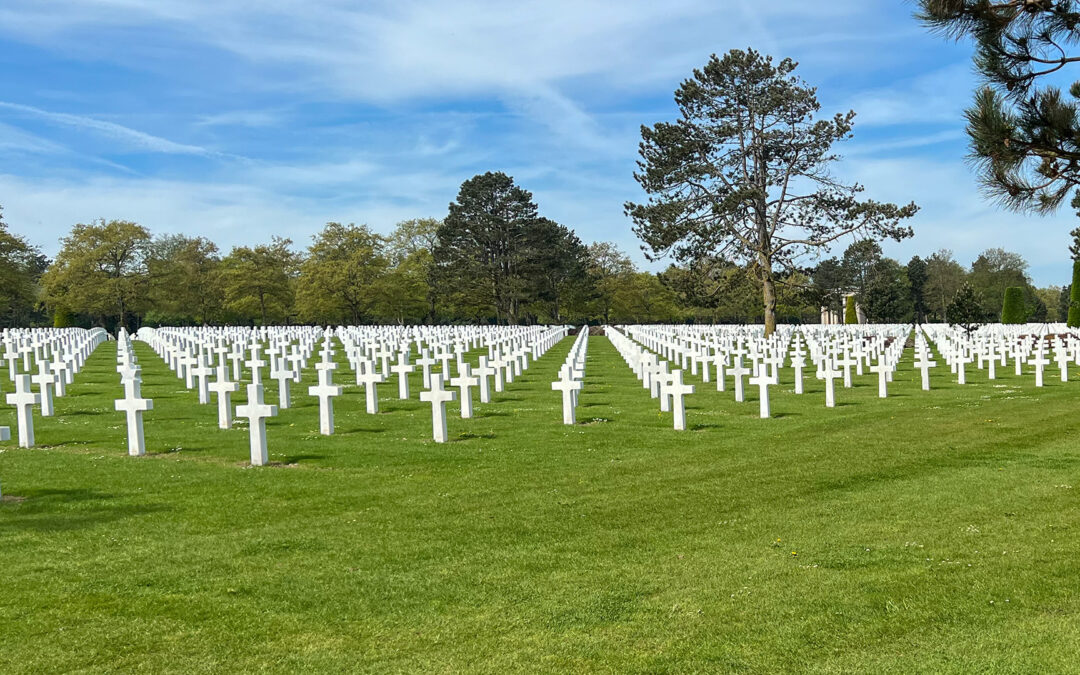
by Robert Bowie, Jr. | May 20, 2025 | Featured, Personal, Travel
When Susan and I flew to Paris again this year for three weeks this spring, I had planned to watch the Bob Dylan movie, “A Complete Unknown” on the flight that night, but I was too tired so I slept instead.
Paris was warming to its spring as we landed at Charles De Gaul airport and traveled into the heart of Paris to a beautiful flat with its view of the Seine from its fifth floor living room and bedroom windows on the Île Saint-Louis.
The six hour difference in the time between the East Coast of the United States and Paris delayed the news reports that poured into my cell phone at three in the afternoon Paris time as America woke up and went to work.
The distance and the time change diminished my obsession to keep up with America’s politics, but nothing could uncouple it from my daily concerns.
Over our three weeks, Susan and I committed to walk the city, but for longer trips to Montmartre or the outskirts of Paris to the Louis Vuitton Museum to see the huge new David Hockney exhibit, we took the Metro.
Each evening, we would go to one of the little restaurants on Île Saint-Louis and then climb the stairs or take the little elevator to the flat to read the news before bed.
Last year. we had taken three days off from Paris to go to the LaVar Valley to stay in a beautiful Château and visit the region’s medieval history. This year, we went to Normandy and, as I observed the beaches and cliffs, and finally the dramatic American cemetery, the pride I’ve always felt for America rekindled with my respect.
On the morning that we flew back in mid May, Paris was in full bloom as we got on the plane to fly into the upcoming day on our return to the United States.
I again committed to watch the Bob Dylan movie on our way home.
Even though it had been out for some time, I still had not seen it, but I knew enough from the reviews that it was about the transition from Dylan’s early folk years to the electric folk rock that Dylan made in 1965.
In the fall of 1965, I had started my first year at the Cambridge School of Weston, a progressive high school that knew something about learning disorders and thus was unlike the boarding schools and summer schools I had attended previously.
It was my second try at 11th grade. My new school was so very different in so many ways, but as my classmates wore sandals and blue jeans and played guitars out on the quad or went off to the ceramic studio and the wide range of classes offered, I attended my classes in a sport jacket, but eventually gave up on the tie.
I believed I was in transition to a better place and I believed that from the start. I was hoping that repeating the 11th grade would rekindle my love of learning in a new environment with a fresh start.
Within weeks of my first day, a sign-up sheet went up in the dining room, which offered tickets and a bus ride provided by the school to see Bob Dylan play in a Boston theater.
I signed up with about 15 of my fellow students and we got on a little bus to go down to the theater.
When we got to the venue in downtown Boston, we were told that it had been sold out almost immediately and, though we had paid for our tickets, no seats had been assigned for us.
The theater instantly took action and placed folding chairs in a semicircle on stage directly behind Bob Dylan.
The first half of the performance was all Bob Dylan singing his folk songs in front of an adoring audience with us directly behind him.
When the audience returned to their seats for the second half of the program, however, a rock ’n’ roll band was now set up to back up Dylan. We pushed our seats back further to accommodate the instruments and cables.
When Dylan entered, he was met with catcalls. I could not believe what was happening in front of me. I sat, self-conscious and a little bit frightened, as Dylan faced the catcalling audience.
Dylan played the first few songs with the electrical back up in the midst of the continuing catcalls.
Somewhere in the middle of one of those songs, a very loud voice broke through and yelled something like, “You sold out!”
Dylan stopped the performance. After a very awkward moment, the silence was broken by Dylan’s voice over the microphone:
“I don’t believe you!” he said, and there was a smattering of applause as he signaled to start the song again, resuming the concert.
As the movie portrayed the transition at the Newport Folk Festival from folk to folk rock, Dylan spoke those same lines to that hostile audience and I returned momentarily to being a teenager on the back of that stage. But I was proud to be there rather than surprised and frightened by the event.
As we landed at Dulles Airport in Washington DC, and returned to our political world, I felt reborn and re-nourished by the experience.
I had this very odd feeling that these juxtapositions had reawakened me to the messy but resilient democracy in which I have been fortunate to have lived and prospered.
Somehow, America, through its history, has been endlessly capable of being reborn, newly appreciative of what the Declaration of Independence and the Constitution have provided for each generation.
Shortly thereafter, I laughed when the news reported that Harvard University had discovered in its archives an original copy of the Magna Carta, which had been presumed to be a copy, purchased in England for less than $30 after the Second World War. It turned out to be the thing itself.
It was a great trip to Paris, which taught me yet again how much I love this country.
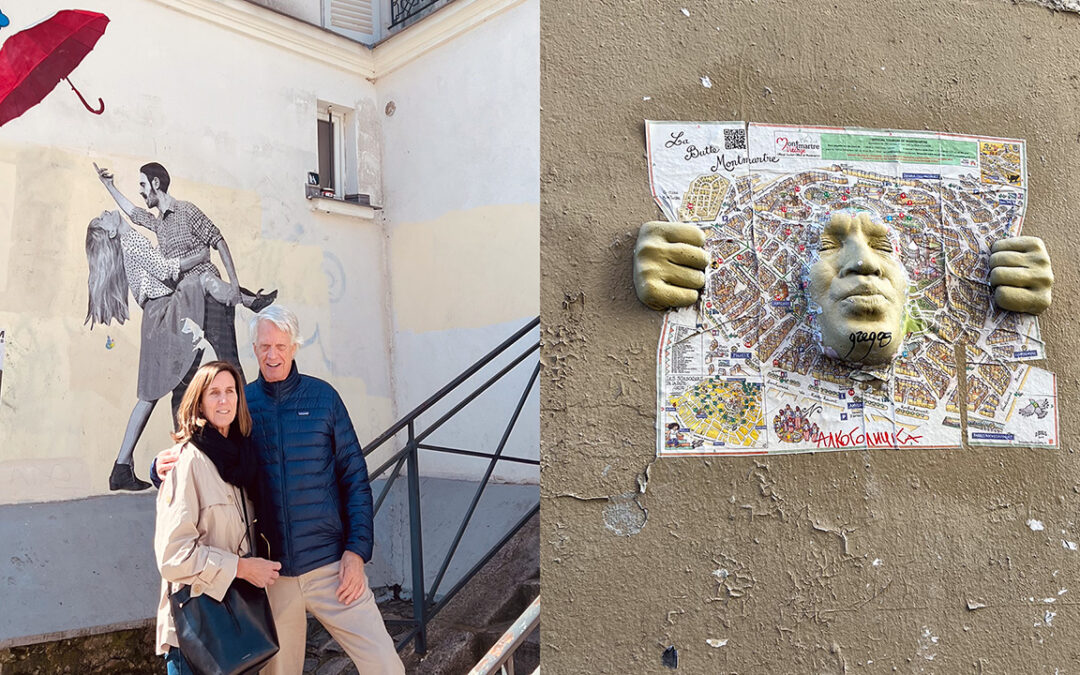
by Robert Bowie, Jr. | Apr 16, 2025 | Featured, Humor, Personal, Politics, Travel
I’m not really worried about Trump taking over Harvard, so Susan and I are going to Paris this Saturday for a couple of weeks.
Why is everybody so upset? It seems like all the commentators have completely overlooked Trump’s leadership skills when he ran Trump University.
Trump has been very vocal about his business acumen and, by his own account, he ran the university brilliantly for the five years before its bankruptcy.
There was some unsubstantiated criticism about gold toilet seats, but he claimed he was always very hands-on and was good at keeping the overhead low.
For example, despite its name, Trump University was never an accredited university or college. It did not confer college credit, grant degrees, or grade its students.
Think about the savings on the cost of paper.
In contrast, the data from the 2023–24 academic year, 72% of Harvard University’s first-time, full-time undergraduates received financial aid. In the alternative, Trump University was apparently so popular, it never needed to offer scholarships. And Trump has already said that he wants to get rid of Harvard’s nonprofit status.
Really! So where is the art of the deal?
Harvard is not effectively selling its product! No. Harvard has been giving it away for free.
What is also great is that Trump has the experience to navigate these litigious times. In 2011, Trump University became the subject of an inquiry by the New York Attorney General’s office for illegal business practices, which resulted in a lawsuit filed in August, 2013. It was also the subject of two class actions in federal court. The lawsuits centered on allegations that Trump University defrauded its students by using misleading marketing practices and engaging in aggressive sales tactics.
Of course!
Everyone knows that Trump is a marketing genius! Okay, let’s get down to what Trump‘s real motives may be.
Both schools have one thing in common.
Neither school has a mascot.
Everybody knows that Trump is a master marketer. I think the hidden agenda will be that Trump will insist that Harvard finally adopt a formal mascot, befitting our country’s white Christian heritage: a Pilgrim, of course!
But even more importantly, this way he can get rid of that out of date logo “Veritas” and change it to “If you piss off a pilgrim, you’ll get yourself a witch trial.” Then he can raise money at halftime with a raffle where the winner gets whisked away for a lifetime in El Salvador.
Anyway, just like last year, Susan and I will be sending back Parisian commentary and pictures to celebrate our spring time and hopefully brighten yours. À bientôt!
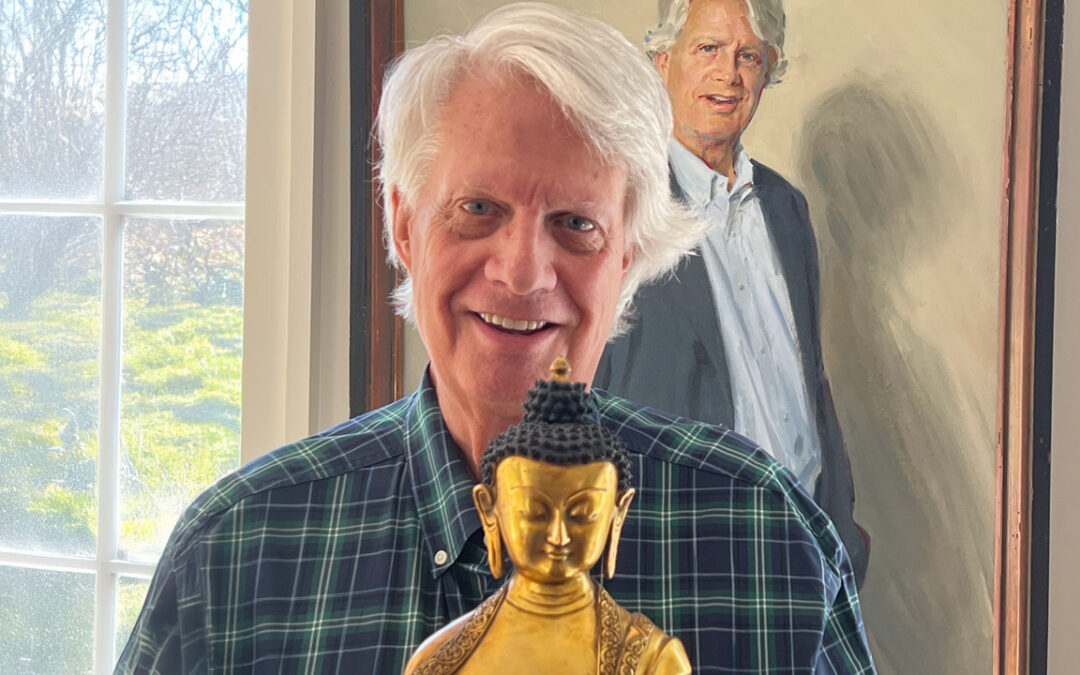
by Robert Bowie, Jr. | Mar 18, 2025 | Featured, Humor, Personal, Travel
In Buddhism, there are instances of instant enlightenment brought by shock or surprise.
(I feel it is okay for me to comment on Buddhism and its wisdom as long as I admit to you that I know nothing about it.)
Nonetheless, I offer an example:
There are instances where a monk will slap a student of Buddhism to surprise them or shock them into enlightenment.
I have always worried about this experience of receiving shock and resultant enlightenment ever since I may have accidentally shocked some Buddhists out of their enlightenment.
It all occurred in the second floor men’s room of The Charles Hotel in Cambridge, Massachusetts.
Many years ago, I took a morning plane to Boston dressed travel casual, with my blue suit, white shirt, tie, black socks and black lace-up shoes in my suitcase. I was to attend important meetings that afternoon in Cambridge.
When I got to The Charles Hotel in the early afternoon, I was informed my room was not ready. I had nowhere to change into my suit.
I was told the delay was because the Dalai Lama and his large entourage were staying at the hotel. The Dalai Lama was there to plant a tree in Harvard Yard with the Harvard president and then scheduled to go off to Foxborough to give a message to the masses in the football stadium. Apparently, the hotel was behind schedule because of these new guests.
Since I couldn’t get into my room, my only alternative was to go to the second floor men’s room of The Charles Hotel with my suitcase and haul it into the handicap stall of the public men’s room, where I would have enough room to change.
I put the suitcase on the toilet seat and began to disrobe and change into my business attire.
I hung my suit on the back of the stall door, unpacked my black shoes and pulled out my dark socks, and was starting to put on the white shirt when I heard the unexpected sound of chattering female voices exploding into the men’s room.
There seemed to be a great urgency and effort to bring in two people who were in wheelchairs. One, a very old woman and the other, a very old man. These voices were not in English.
I stood there, stunned with my suit pants in one hand and a black sock in the other and stood listening. It sounded like a kitchen in a busy restaurant.
I tried to peek through the crack in the door, but only saw a flurry of female activity. All I could make out was at least one person, perhaps more, had an urgent need to go to the bathroom.
I waited patiently with my sock and my pants, but nobody was leaving. It was as if everybody, male or female, had to urgently go to the bathroom.
I waited for nearly 10 minutes, but I was late for my meetings, so I had to make a decision about what to do.
I quickly dressed and repacked my suitcase. I decided to open the door and just march straight through this mob of people.
Given the circumstances, this was a very rude thing for me to do, but given the fact that I was in a men’s room, I felt entitled.
With my suitcase in one hand, I pushed open the door and confronted the group.
Instantly, there was stunned silence and, as if my mind were a flash camera, I had a mental picture of as many as 20 colorfully-dressed people staring at me with their mouths open.
There were people staring as they stopped washing their hands. There were people staring as they stopped midway through entering or exiting a stall. Everything was frozen.
Then there was a collective gasp. Not a shriek or anything, just a gasp. I tried to pretend I was invisible as I barreled toward the exit with a sea of bright colors parting on both sides.
I may have caused significant damage. Or, possibly, I shocked some of the entourage into a different vision of enlightenment.
First, it was clearly an emergency of some sort. Somebody had to really go to the bathroom badly and I fear it was an old person.
Second, these were elderly people in wheelchairs and I am not handicapped but I was in a handicap bathroom.
Third, and finally, I consider myself a very sensitive person but even if I had no empathy at all, one must consider reincarnation in all of this.
I offer no excuses. I think there may have been damage done to me, as well. I’m certain my karma is permanently shot. If there is reincarnation, I shudder to think what I will come back as.
So I’ve confessed it. I will also confess that I’m a believer in the “butterfly effect,” which is that every action causes a ripple across the universe.
If anything good comes from this, it is simply that I can warn you to be careful if you run into a similar situation.
You never know when a cosmic event will hit you.
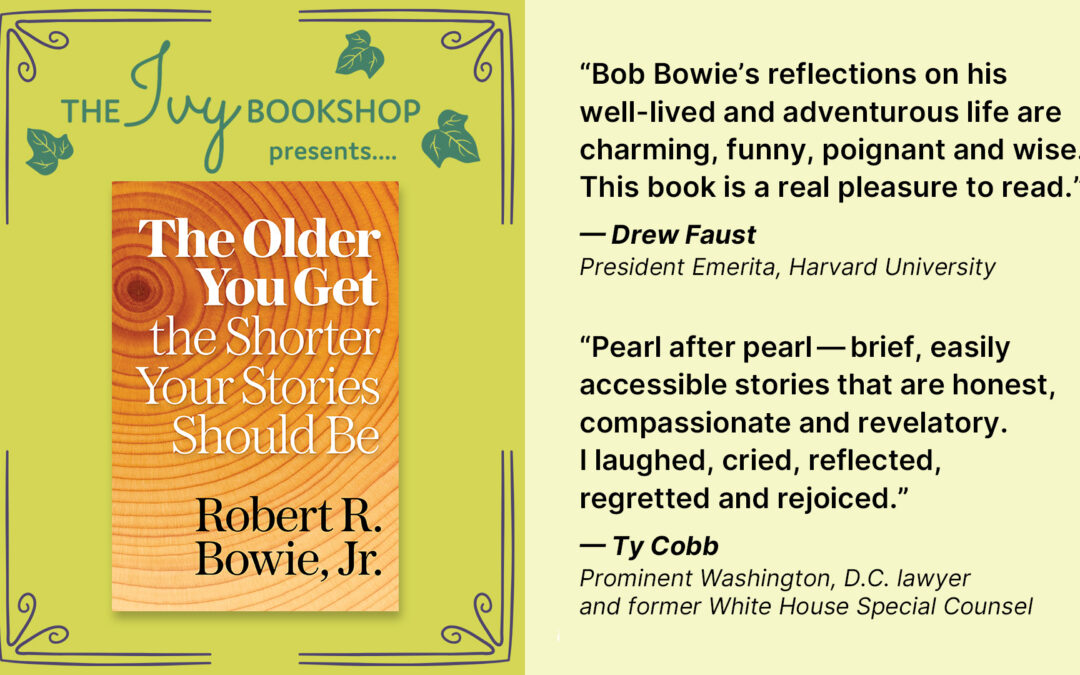
by Robert Bowie, Jr. | Dec 3, 2024 | Featured, General, Personal, Shorter Stories Book, Travel
If you’re tired of Black Friday, Small Business Saturday, Cyber Monday, and Gift Return Tuesday, I have an alternative for you that will make you laugh.
First, I bet you that you have never been as embarrassed as I have been. If you start laughing as you read this story, continue on to get a reward after you’ve finished reading.
The Story:
You think you’ve been embarrassed? Well, I’ve got you beat.
First, it all happened to me on the other side of the planet so I couldn’t go home, turn off the lights and put my head under the pillow.
It happened in Xi’an, China, in an airport the morning I was scheduled to fly to Chongqing to see a panda sanctuary, then board a boat to go down the Yangtze river through the Three Gorges, and then down to Shanghai.
Second, I was traveling with a small group and the Xi’an Airport was huge, so I had nowhere to hide as my embarrassment went on and on and on…
It all started innocently at dinner the night before we were scheduled to fly out of the Xi’an airport the next morning. Our guide addressed the group and informed us that because our plane left so early the next day we all must have our bags packed and outside of our door at 4:30 so they could be picked up and taken to the airport before we went to breakfast.
Everything had to be packed except the clothes we would be wearing the next day and whatever toiletries we required for that morning.
We were told that those toiletries, once used, had to be carried on our person until we landed at Chongqing airport several hours later at which time we could return them to our suitcases.
After dinner that night, we all went up to our rooms, picked out the essential toiletries, which in my case was toothpaste, toothbrush, shampoo, razor, soap, and hairbrush. I also chose my clothes for the next day, which in my case, were one of my endless pairs of khaki pants, a blue long sleeve business shirt, underwear, sox and shoes.
All the rest was packed in the suitcase, which I put outside the door right before I set the alarm and went to bed.
The next morning when my alarm went off, before I showered and shaved, I peeked out the door. My suitcase was gone and on its way to the airport. I looked at the clock and measured the short time I had to get to breakfast.
After my shower, I bundled up my toiletries, put on my blue business shirt and started to pull up my khaki pants, but couldn’t understand why I couldn’t get them on until I realized that the only pair of pants I had to wear were actually those I had mistakenly packed, which unfortunately belonged to my teenage son.
My son has a 32-inch waist. I do not.
I was running out of time. I had to get to breakfast.
I grabbed both sides of the pants so that my fingers gripped the pockets and I hoisted as hard as I could. No progress.
Next, I lay on my back on the bed with my feet extended in the air and bounced on the bed to get maximum leverage, kicked my feet into the air and yanked with all my strength. No progress.
The top of the pants made it to maybe slightly above my crotch. I’m pretty certain I did not get the pants high enough to halfway cover my back end. Nothing.
Next, I tried straddling a chair and forcefully rode my pants like a cowboy rides a horse in order to force the crotch into submission. I then tried jumping up and down to get maximum thrust, lift and torque. Nothing. This was not good!
I had to get to breakfast but I couldn’t leave the room. This was not good at all!
I reassessed my situation.
I still had to put on my shoes and socks. I would have to roll up the bottom of the pants so that I wouldn’t trip over them.
I was able to walk, but only if I could hold the top of my pants up as high as possible, and walk with my knees banging together every time I took a step.
I searched the room for any possible help. I was fortunate to find yesterday’s Chinese newspaper — bright with color — to cover my crotch.
It was a very long and slow elevator ride for every inch of the decent down maybe three floors. I noticed that the Chinese people in Xi’an, at least in this elevator on this particular morning, tended to be very quiet as they tried to find someplace else to look other than at my crotch.
My group at breakfast was less forgiving. They had to stop eating because they couldn’t stop laughing.
Our guide tried to be helpful and encouraged me to wander the airport to find a clothing store, apparently in the hope that I could learn Mandarin instantly and acquire a pair of pants that was twice the size that any self-respecting member of the culture would never wear.
The guide was just trying to be helpful I know, but didn’t seem to understand that I was really, at this point, no longer interested in clothing. I was no longer hoping to fit into the culture.
I was hoping to vanish from the face of the earth.
Everyone in the airport seemed to be walking by and rubbernecking in order to catch sight of whatever everyone else was laughing at.
I was completely hunched over, gripping my newspaper and pants, with my pant legs rolled up above my ankles and, just to add to my unlikely assimilation into the culture, I was wearing my disposable razor, shaving cream, toothbrush, toothpaste and hairbrush bundled up into a boutonniere blooming from my shirt pocket to add to my look.
The Chinese newspaper was fast becoming my most valuable asset since, as it turned out, my seat on the plane was between two meticulously dressed, very frightened Chinese businessmen who apparently feared any eye contact with me, their fellow traveler, for fear that it might prompt me to flash them.
In times like this I try to focus on making my situation into a positive learning experience.
After thinking about my situation for a little while, I concluded there wasn’t a lot to learn so, in the alternative, I thought it might be helpful to try to imagine what could be worse than what was happening to me at this exact moment.
I no longer wonder what it must feel like to wear a miniskirt if you are knock kneed, but that wasn’t bad enough, so I tried to imagine what it was like to wear a miniskirt, knock kneed with high heels.
I made sure that I would be the last person to leave the plane when we landed. in order to give the baggage handlers extra time so when I went to pick up my bag it would be there.
I hid in the airport men’s room for a while. I was afraid I had permanently injured my lower intestines. I was sure I had bruising. I couldn’t really lift or lower my pants now.
Eventually, I built up all my courage and raced through the teeming airport hunched over, with one hand holding the top of my pants and the other gripping my newspaper.
I swooped down on my bag and hauled it into the men’s room, found a stall, opened the suitcase, liberated myself of my son’s pants, and instantly threw them away for no good reason other than I needed to purge them.
A few months ago, I went on a trip with some of that same group that had gone on the China trip. When my story came up, I refused to relive the experience, so they went right ahead and told it anyway. They kept on embellishing the story at my expense.
The trip to China was 10 years ago, and the listeners could not stop laughing. Apparently, it gets better and better.
One person, who I am not sure was even on the China trip, claimed to have seen it all from the back and referred to it as “the morning the moon rose over the Yangtze!”
I must now live in infamy forever.
—
The Reward:
Good for you! You laughed. You are honest because here you are and so you deserve a reward. Now that you’ve laughed you don’t feel quite as bad about not completing your holiday shopping on Black Friday do you?
So here is your reward.
You will be pleased to learn all your remaining shopping can be completed for everybody left on your list, including stocking stuffers!
That story, which you just read, about my “streaking” through China is the very first story in my book, The Older You Get the Shorter Your Stories Should Be, which is now available at The Ivy Bookshop, The Manor Mill, Porter Square Books, or you can order from Bookshop.org (https://bookshop.org/shop/robertrbowiejr) or Amazon.com, where there’s even a Kindle version now! Or you can ask your any book store worldwide to order it using the following ISBN: 978-1628064209.
In addition, this book is perfect for regifting. Buy a copy for yourself. Tell your second recipient that you’ve road tested it because you care so much for them.
Finally, all the stories are short and perfect for your friends and family with short attention spans and they are great for deliberate bathroom reading and, of course, if you buy lots of copies you will make me really happy, too.






